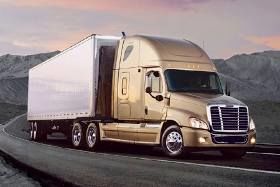Question For Our Prime-ates Here
Topic 19703 | Page 3

I'm trying to envision the mental image Tastebuds had of "blue tiger set"
Well ... blue tiger stripes... honestly that's what I was looking for. I mean, seriously, if I'm describing myself to someone that has never seen me before, I would describe what is DIFFERENT about me and not something small that 60% of the trucker population has. For instance, last night, I would've described myself as long red hair, glasses, light green shirt, and gray shorts and not "the guy with clothes on, an ID badge, and some hair"! I'm sorry Rainy, but I completely didn't get the blue tiger set description...

I would've been looking for a pair of zubaz. Seems like someone from Jersey would wear those without any shame.
HOS:
Hours Of Service
HOS refers to the logbook hours of service regulations.Knight I could only do 63mph with cruise control, pride I can do 65 plus up tot 68mph for 30 min a day. This allows me to go further in a day
Really? And this has had a noticeable impact on your daily mileage, ability to make appointment times, and paychecks?
Come on, man. Don't drive yourself crazy nitpicking at silly stuff like that. You get caught at one red light pulling out of a truck stop, or have to wait behind one person buying a lottery ticket, or the fuel pumps pump .1 gallons per minute slower and you've lost anything you might have gained that day going 2 mph faster. It makes no difference.

Knight I could only do 63mph with cruise control, pride I can do 65 plus up tot 68mph for 30 min a day. This allows me to go further in a day
Really? And this has had a noticeable impact on your daily mileage, ability to make appointment times, and paychecks?
Come on, man. Don't drive yourself crazy nitpicking at silly stuff like that. You get caught at one red light pulling out of a truck stop, or have to wait behind one person buying a lottery ticket, or the fuel pumps pump .1 gallons per minute slower and you've lost anything you might have gained that day going 2 mph faster. It makes no difference.
In the short term you might be correct. Getting stopped at a light or whatever could cancel out anything you've gained.
However, all else being equal, in the long term the guy that can drive faster is going to come out ahead - obviously. The question is whether it's an insignificant amount. Opinions will differ about that, but consider this:
Say you have two drivers, D1 who can drive at a top speed of 65, and D2 with top speed of 63. And say, on average, they are both able to drive at their top speed for 8 hours per day, so that D1 covers 520 miles per day, and D2 covers 504 miles per day during that 8 hour period. So, all else being equal, D1 covers 16 miles more per work day than D2. And say that both work 300 days per year. Then, D1 gets (300 x 16) 4800 miles more than D2 for the year. And say they each make $0.42 per mile. That means D1 makes $2,016 more than D2.
However, all else being equal, in the long term the guy that can drive faster is going to come out ahead - obviously. The question is whether it's an insignificant amount. Opinions will differ about that
I kept myself from commenting on Phox's silly notion the other day about having a truck that does two miles per hour faster helping him make more money. I was really surprised that someone who has been involved here for as long as he has would believe such a common misconception, but knew that someone would have something to say about it. Sure enough, Brett, who like me, just can't bear to let something like that just "hang" out there for others to be confused by it spoke up.
Rajinder, the whole problem with believing such foolishness is that there is nothing equal out here. Oh we can go on and on about how we are all driving the same type of trucks on the same interstates, and that we are all limited by the same regulations, and all that type of stuff. But what separates one driver from the other in terms of the ability to consistently increase his pay is his understanding of how to take all those seemingly equal things and still come out ahead at the end of the day. Understanding the fact that this is a competitive career is what makes all the difference in understanding how one succeeds at this career.
You can set five guys together in a foot race at the same starting point and assume all things are equal just by the fact that each of them is wearing gym shorts, has equally nice Nike running shoes, and each of them has two good pair of legs. There is going to be a winner, a loser, and three other positions sorted out in there somewhere in between. It is a competition, and in competitions there is no such concept of all things being equal - otherwise no one would compete, they would be looking for other little advantages such as you and Phox are demonstrating by trying to get an advantage by having a truck that can go a measly two miles per hour faster! A person who understands the concept of competing laughs at such silly attempts, because that person is still going to beat you in the end.
We have hashed these concepts out so many times in here, and I simply don't have the time to do a dissertation on it right now, but in the end the guy who understands how to move his appointments forward with great customer service efforts, and then understands how to use the regulations and rules to his advantage (knowing the ins and outs of the rules and how to use them for efficiency as opposed to feeling restricted by them), knowing how to communicate effectively with dispatch, and knowing who to talk to if there is an issue that arises. Keeping your word, and following through with a consistent track record of getting more done - all these things are the high points of what allows you to get more done, and therefore consistently be in the top tier of successful drivers. There are a lot of other little things that we could go over also, but these are the high points of what it takes to succeed out here. I promise you that you could have a truck that goes five to ten miles per hour faster than mine, and you would still be challenged to keep up with me. I'm not bragging, I'm just saying that that speedometer is no measure of success out here. It is a waste of a rookies attention to believe such things as measuring how much you can get done by the speedometer. There are far too many other metrics that make for success at this. The speed of the truck would be at the absolute bottom of my list for how to succeed at trucking.
Interstate:
Commercial trade, business, movement of goods or money, or transportation from one state to another, regulated by the Federal Department Of Transportation (DOT).
HOS:
Hours Of Service
HOS refers to the logbook hours of service regulations.OWI:
Operating While Intoxicated

I wonder if there was a way the trucks couls keep their intended torque and horsepower, but still have their speed cap. That would be convienent for climbing mountains.
I wonder if there was a way the trucks couls keep their intended torque and horsepower, but still have their speed cap. That would be convienent for climbing mountains.
Yes, they certainly can. All of those metrics can be plugged into the computer. The engineers lay out out all of the available options for a motor and how each one would ultimately affect horsepower, torque, fuel mileage, and the life of the engine itself. The companies then choose the compromise they feel works best for them. Some companies may choose to run a few miles per hour faster but turn down the maximum torque and horsepower for the hills, others might choose the opposite.
A lot of drivers think that if a truck's speed is capped at a certain rate then the engine is "castrated" and doesn't have the power it should. That's not true at all. These metrics can all be programmed in independently. Most companies do, of course, limit the torque, horsepower, and speed to give their fleet the best compromise of power, fuel efficiency, and engine and drivetrain reliability.
HOS:
Hours Of Service
HOS refers to the logbook hours of service regulations.OOS:
When a violation by either a driver or company is confirmed, an out-of-service order removes either the driver or the vehicle from the roadway until the violation is corrected.

When I was doing OTR , my truck was governed at 65. So I figured I could travel on average 600 miles a day if I had to. Also, an experienced driver gave me a good tip on how to run my clock. I would drive 10,10,10,8,8,8,8. That method worked great for me. Only had to do 1 34 hr reset in 6 months and that was because of the planner not listening to me about the time I had left on my clock.
OTR:
Over The Road
OTR driving normally means you'll be hauling freight to various customers throughout your company's hauling region. It often entails being gone from home for two to three weeks at a time.

Rajinder wrote:
In the short term you might be correct. Getting stopped at a light or whatever could cancel out anything you've gained.
However, all else being equal, in the long term the guy that can drive faster is going to come out ahead - obviously. The question is whether it's an insignificant amount. Opinions will differ about that, but consider this:
Say you have two drivers, D1 who can drive at a top speed of 65, and D2 with top speed of 63. And say, on average, they are both able to drive at their top speed for 8 hours per day, so that D1 covers 520 miles per day, and D2 covers 504 miles per day during that 8 hour period. So, all else being equal, D1 covers 16 miles more per work day than D2. And say that both work 300 days per year. Then, D1 gets (300 x 16) 4800 miles more than D2 for the year. And say they each make $0.42 per mile. That means D1 makes $2,016 more than D2.
Rajinder (and Phox) your whole theory literally goes out the window when you consider frequent grades (when loaded), decreasing speed for highway curves, posted speed limits, slowdowns due to construction, slow-downs due to accidents and basic traffic congestion caused by volume. The United States isn't completely flat and certainly not void of traffic issues. Rajinder you are not going to average 65mph for prolonged periods of time.
The notion of a 2mph increase in speed significantly increasing productivity and earning potential is ridiculous and moot.
New Reply:
New! Check out our help videos for a better understanding of our forum features

















Preview:
This topic has the following tags:
Knight Transport Prime Inc Advice For New Truck Drivers Choosing A Trucking Company Time Management Truck Driver Salary







 TT On Facebook
TT On Facebook
I'm trying to envision the mental image Tastebuds had of "blue tiger set"